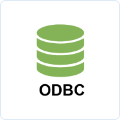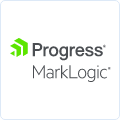
Get Started with MarkLogic

Software
MarkLogic Server is a multi-model database with modern, trusted enterprise capabilities to power operational, transactional and analytical applications.
MarkLogic Data Hub runs on top of MarkLogic Server and offers a visual interface for building data flows to integrate, model and access data.
MarkLogic Server
Developer License
- For Non-Commercial Use Only
- Full-featured version for development use
- Up to 1TB of data
- Multi-model (JSON, XML, graph)
- Built-in search with immediate indexing
- Granular, role-based security
MarkLogic Server Enterprise
Enterprise License
- Full-featured version for production use
- Subscription pricing
- Multi-model (JSON, XML, graph)
- Built-in search with immediate indexing
- Granular, role-based security
MarkLogic Data Hub
Enterprise License
- Accelerate your start with MarkLogic Server
- Intuitive Modeling UI
- Smart Mastering
- Entity Modeling
- Data Lineage
- Full MarkLogic Server security capabilities included
Tools
MarkLogic APIs provide a tremendous amount of functionality while serving as a software program interface to facilitate interaction.

Node.js Client API
The Node.js Client API is an open-source JavaScript library that allows Node.js developers to get going immediately as they can quickly, easily, and reliably access MarkLogic from their Node applications.

Java Client API
Access core MarkLogic database and search functionality. The Java API allows Java developers to get going quickly by using existing libraries, tools, and development environments to build new applications.
MarkLogic connectors provide a convenient option for MarkLogic customers to try additional products and services, as well as provide an easy integration for daily business needs.

PowerBI
Easily connect Microsoft Power BI with live MarkLogic data for up-to-date visual analysis and reporting.

Tableau
Easily connect Tableau with live MarkLogic data for up-to-date visual analysis and reporting.

MuleSoft
The MarkLogic MuleSoft Connector provides easy integration to MuleSoft, delivering data movement and transformation pipelines via MuleSoft Anypoint Studio and Anypoint Design Center flows.

NiFi
The MarkLogic NiFi Connector provides easy integration to NiFi and can be integrated with the MarkLogic Java Client API and DMSDK.

ODBC
The MarkLogic ODBC Driver is a powerful tool that allows developers to connect with live MarkLogic databases, directly from any applications that support ODBC connectivity.

Pega
The Pega MarkLogic Connector allows MarkLogic customers to use the Pega Repository API to enable content storage and retrieval directly from the MarkLogic database.

XML Contentbase Connector (XCC)
The XML Contentbase Connector (XCC) is an interface to communicate with MarkLogic Server from a Java middleware application layer using the XDBC protocol.

Apache Spark
The MarkLogic Connector for Apache Spark makes it easy to implement Spark jobs for ingesting data into and exporting data from a MarkLogic Data Hub.

AWS Glue
The MarkLogic Connector for AWS Glue makes it simple to implement scalable ETL pipelines for ingesting data into and exporting data from a MarkLogic Data Hub.
MarkLogic utility libraries and plugins let developers easily create an open platform. It provides the most efficient way to monitor, communicate, and integrate resources.

MarkLogic Content Pump (MLCP)
MarkLogic Content Pump (MLCP) is an open-source, Java-based command-line tool. MLCP provides the fastest way to import, export, and copy data to or from MarkLogic databases.

Gradle
A Gradle plugin that can automate everything you do with MarkLogic: deploy an application, add a host, backup a database, stub out a new project, load modules as you modify.

Corb2
CORB is a Java tool designed for bulk content-reprocessing of documents stored in MarkLogic. In a nutshell, CORB works off a list of documents in a database and performs operations against those documents.
Explore All Tools